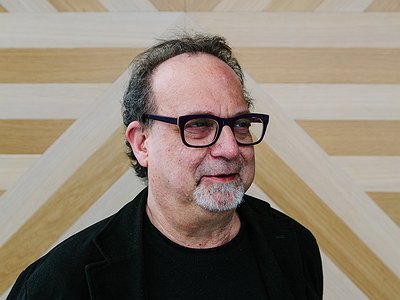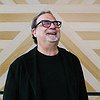Part 2
Could you describe your creative process on the basis of a piece or album that's particularly dear to you, please? Where did the ideas come from, how were they transformed in your mind, what did you start with and how do you refine these beginnings into the finished work of art?
I guess I would have to cite my piece Shing Kee, which I composed in 1986. It’s the piece that uses a small fragment of Shubert lieder sung in English by a Japanese pop singer. It was a bit of a breakthrough moment for me when I figured out how to do what came to be known as granular synthesis on a standard-issue 1980’s MIDI sampler.
The reasons I am fond of the piece are because it has a lot of favored attributes of the minimal music of the 60’s, that I both love and respect:
A reduction of musical identities to just one or two
A process that is applied methodically and is also coherent to the attentive listener
An element of surprise
An appeal to both intellect and emotion
There are many descriptions of the ideal state of mind for being creative. What is it like for you? What supports this ideal state of mind and what are distractions? Are there strategies to enter into this state more easily?
Perhaps I am insufficiently self-aware but I’m haven’t really identified an idealized state for being creative. It has always seemed sort of random as to when I might be properly inspired or motivated to be creative.
I think discipline is important which is why I try to put in an hour or two for my music every day, whether I feel the urge to create or not. I must say that the inability to travel freely because of COVID has on the one hand left me frustrated but has allowed me to develop a more disciplined routine. I actually wrote more music this year 2020 than in the previous two years combined.
How is playing live and writing music in the studio connected? What do you achieve and draw from each experience personally? How do you see the relationship between improvisation and composition in this regard?
My recordings, if we exclude the archive releases like Music from the 70’s and 80’s, consist mostly of tracks made in studio as documents of live performances, with very little overdubbing or editing. I do sometimes apply cosmetics to these however.
How do you see the relationship between the 'sound' aspects of music and the 'composition' aspects? How do you work with sound and timbre to meet certain production ideas and in which way can certain sounds already take on compositional qualities?
I usually start with a period of play and experimentation, and it can either be with a process I am exploring or some musical material that I would like to delve deeper into the inner workings of. At first I am almost messing around without any particular goal in mind, but eventually some idea about structuring will begin to take hold. This wold be the “composing” part of the equation I guess, although for me it’s all composing really.
Our sense of hearing sharers intriguing connections to other senses. From your experience, what are some of the most inspiring overlaps between different senses - and what do they tell us about the way our senses work? What happens to sound at its outermost borders?
I’m curious about it, especially after I heard that in some cases COVID can actually cause the swapping of sensory stimuli. Cognitive neuroscientists believe that synesthesia is a condition in which a stimulant will consistently elicit a secondary experience that is atypical – in the case of music sounds would be experienced as colors or shapes or smells etc.
Personally, I experience music in a mostly orthodox way, whether while composing or just listening, but it often makes me think of shapes and patterns. I think it might have something to do with living in Japan for almost twenty years. I remember a conversation I had many years ago with the composer Maki Ishii, who pointed out that written Japanese is based on pattern recognition of characters that have intrinsic meaning, and not the parsing of abstracted letters which mean nothing by themselves.
I have heard that Duke Elllington had strong chromesthesia, where sound will stimulate the sense of color. This news somehow excited me – but my enthusiasm dampened a bit when I found out Billy Joel had the same.
Art can be a purpose in its own right, but it can also directly feed back into everyday life, take on a social and political role and lead to more engagement. Can you describe your approach to art and being an artist?
One of the things that art does is make us reexamine basic assumptions about meaning. In my case, I am fond of hijacking the surface attributes of popular music in order to create new perspectives on its value, and it seems self-evident this has political and social implications as well as the artistic ones.
But honestly speaking this is not my primary goal. At heart I’m a naïve composer just trying to get my musical rocks off by creating things that can tickle both hemispheres of my brain, and hopefully those of other people as well.
It is remarkable, in a way, that we have arrived in the 21st century with the basic concept of music still intact. Do you have a vision of music, an idea of what music could be beyond its current form?
Not only intact but expanded! There was great convulsive upheaval in music that happened in the 20th Century, and an expansion of the definition due to pioneers like the Futurists, Fluxus, Cage and Xenakis.
I am asked from time to time for my prognostications about the future of music. Back in 1984 I predicted media that would allow “consumers” to stream music and also play with the form and content in interactive ways, not “composers” might like we can do with video games using parallel story lines and multiple endings. This idea seemed threatening to some. I remember a panel discussion in Japan 1984, during my first visit there, where I was criticized by some of my fellow panelists who felt I was advocating the abolishment of the authority of the composer. I really had no such pretentious goals,it was just I found the idea so intriguing and in a sense inevitable.
I have no crystal ball and would love to be around as long as I can to see how music will be created and consumed in the far ahead future. I suspect that cognitive science will have an increased role, and also physical modification of the human body. I can imagine that cochlear implants might be a cool way to listen to some new musical medium.






